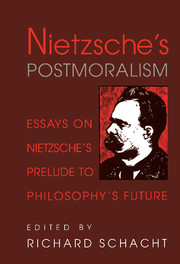Book contents
- Frontmatter
- Contents
- Contributors
- Preface
- A Note on References
- Introduction
- Nietzsche on the Illusions of Everyday Experience
- Masters without Substance
- Rethinking the Subject: Or, How One Becomes-Other Than What One Is
- The Youngest Virtue
- Morality as Psychology, Psychology as Morality: Nietzsche, Eros, and Clumsy Lovers
- On the Rejection of Morality: Bernard Williams's Debt to Nietzsche
- Nietzsche's Virtues: A Personal Inquiry
- Nietzschean Normativity
- Nietzsche's Perfectionism: A Reading of Schopenhauer as Educator
- Bibliography
Masters without Substance
Published online by Cambridge University Press: 20 May 2010
- Frontmatter
- Contents
- Contributors
- Preface
- A Note on References
- Introduction
- Nietzsche on the Illusions of Everyday Experience
- Masters without Substance
- Rethinking the Subject: Or, How One Becomes-Other Than What One Is
- The Youngest Virtue
- Morality as Psychology, Psychology as Morality: Nietzsche, Eros, and Clumsy Lovers
- On the Rejection of Morality: Bernard Williams's Debt to Nietzsche
- Nietzsche's Virtues: A Personal Inquiry
- Nietzschean Normativity
- Nietzsche's Perfectionism: A Reading of Schopenhauer as Educator
- Bibliography
Summary
Nietzsche has a problem: reconciling his denial of substance with his doctrine of the will to power. I shall first explain in more detail what the problem is and then propose a way out.
Nietzsche's denial of substance is put forward in the following passage from GM I:13:
Ein Quantum Kraft ist ein eben solches Quantum Trieb, Wille, Wirken – vielmehr, es ist gar nichts anderes als eben dieses Treiben, Wollen, Wirken selbst, und nur unter der Verführung der Sprache (und der in ihr versteinerten Grundirrthümer der Vernunft), welche alles Wirken als bedingt durch ein Wirkendes, durch ein “Subjekt” versteht und missversteht, kann es anders erscheinen. Ebenso nämlich, wie das Volk den Blitz von seinem Leuchten trennt und letzteres als Thun, als Wirkung eines Subjekts nimmt, das Blitz heisst, so trennt die Volks-Moral auch die Stärke von den Äusserungen der Stärke ab, wie als ob es hinter dem Starken ein indifferentes Substrat gäbe, dem es freistünde, Stärke zu äussern order auch nicht. Aber es giebt kein solches Substrat; es giebt kein “Sein” hinter dem Thun, Wirken, Werden; “der Thäter” ist zum Thun bloss hinzugedichtet, – das Thun ist Alles.
In Kaufmann and Hollingdale's translation:
A quantum of force is equivalent to a quantum of drive, will, effect – more, it is nothing other than this very driving, willing, effecting, and only owing to the seduction of language (and of the fundamental errors of reason that are petrified in it) which conceives and misconceives all effects as conditioned by something that causes effects, by a “subject,” can it appear otherwise. […]
- Type
- Chapter
- Information
- Nietzsche's PostmoralismEssays on Nietzsche's Prelude to Philosophy's Future, pp. 34 - 46Publisher: Cambridge University PressPrint publication year: 2000
- 2
- Cited by



